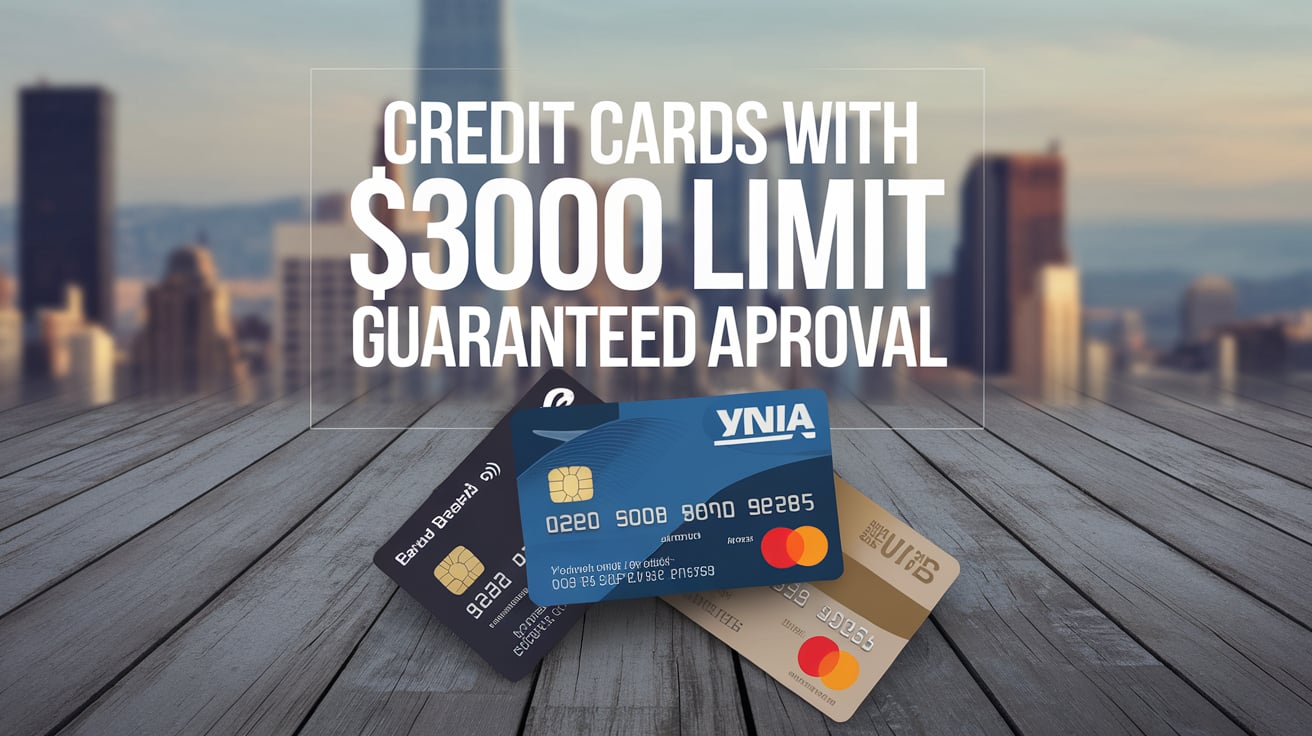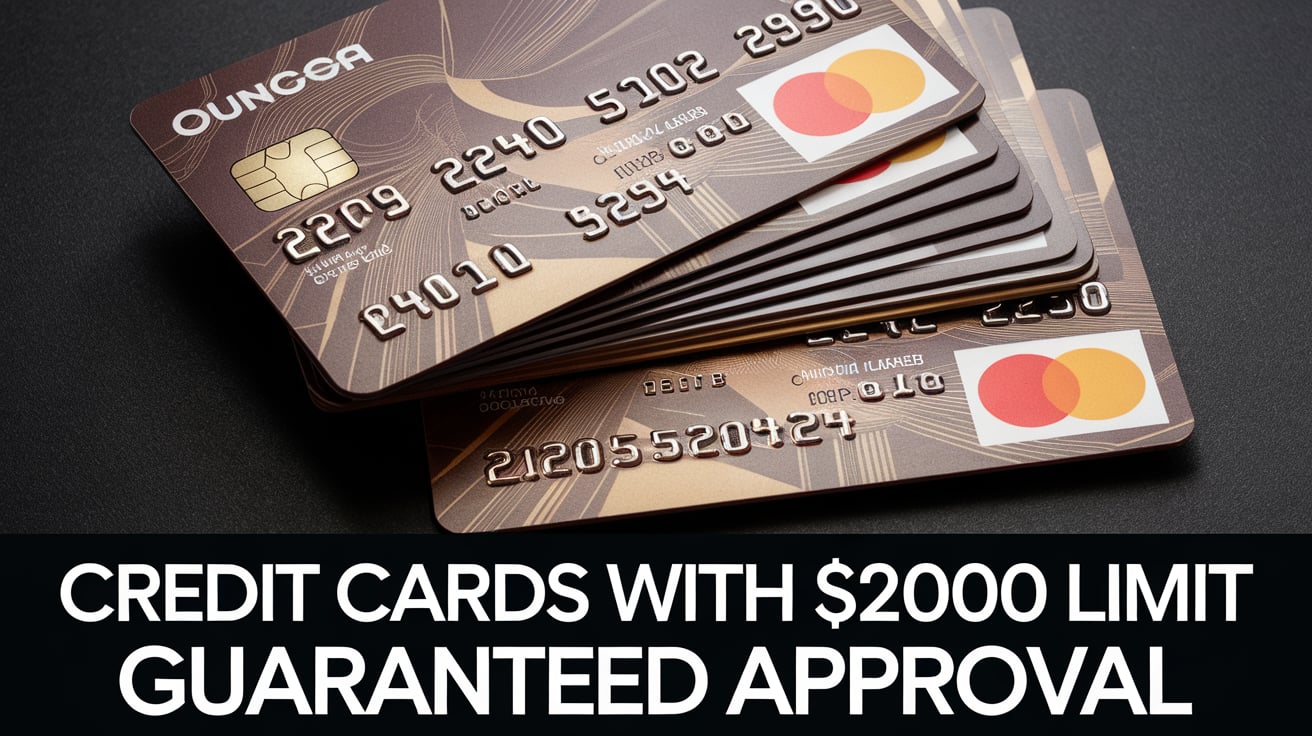Credit cards with a $3000 limit and guaranteed approval provide a convenient option for individuals seeking financial flexibility and a reliable line of credit without the hurdle of stringent approval processes. These cards cater to a wide audience, including those with fair or limited credit histories, offering a higher-than-usual credit limit.
This article will comprehensively cover what these cards entail, their features, benefits, and application process, along with tips for managing them responsibly same as our previous articles No Credit Check Credit Cards Instant Approval No Deposit, Credit Cards with $2000 Limit Guaranteed Approval and Credit Cards with $500 Limit Guaranteed Approval.
What Are Credit Cards?
Credit cards are financial tools that provide users access to a revolving credit line up to a specified limit. They allow individuals to make purchases, pay bills, or access cash advances, with the expectation of repayment at the end of a billing cycle. Credit cards are instrumental for building credit history and financial management when used responsibly.
What Are Guaranteed Approval Credit Cards?
Guaranteed approval credit cards are designed to provide easier access to credit for those with varying credit profiles, including individuals with limited or poor credit histories. While no card truly guarantees approval for everyone, these cards usually have minimal qualification requirements, such as proof of income and identification.
What Are Credit Card Limits?
A credit card limit is the maximum amount a cardholder can borrow on their card. For cards offering a $3000 limit, this means users can make purchases up to this amount. Limits are determined based on factors like income, creditworthiness, and card type.
Is Getting Credit Cards with $3000 Limit Guaranteed Approval Good?
These credit cards can be highly beneficial, offering a substantial credit line and the opportunity to improve financial stability. However, responsible use is crucial to avoid falling into debt. They are particularly advantageous for individuals needing a higher limit for emergencies or large purchases.
What Are Credit Cards with $3000 Limit Guaranteed Approval?
Credit cards in this category offer a $3000 credit limit upon approval with minimal barriers to entry. Some may require a security deposit (for secured cards), while others are unsecured. They are ideal for individuals aiming to improve their credit profiles or manage larger expenses.
How Do I Choose Credit Cards with $3000 Limit Guaranteed Approval?
When selecting a credit card in this category, consider the following factors:
- APR: Look for cards with competitive interest rates.
- Fees: Check for annual fees, maintenance fees, and penalty charges.
- Credit Building: Ensure the card reports to major credit bureaus.
- Rewards: Look for additional perks like cashback or travel rewards.
Top 5 Credit Cards with $3000 Limit Guaranteed Approval
When it comes to building credit or managing larger purchases, credit cards with a $3000 limit and guaranteed approval are an excellent option. These cards often come with various features that help users improve their financial standing, while also offering flexibility in how they manage their finances. Here’s a detailed breakdown of the top 5 credit cards with a $3000 limit and guaranteed approval…

1. Discover it® Secured Credit Card
The Discover it® Secured Credit Card is a secured credit card designed for individuals looking to rebuild or build their credit score. This card offers a generous rewards program and no annual fee, making it a great option for those with poor or limited credit history.
Features:
- Requires a refundable deposit to secure the credit limit (usually matching the deposit amount).
- Reports to all three major credit bureaus (Experian, Equifax, and TransUnion).
- Offers cashback on purchases: 1% on all purchases and 5% on rotating categories (up to the quarterly maximum).
- Provides access to your FICO® score for free.
- After seven months of responsible use, you may be eligible to graduate to an unsecured card.
Pros:
- No annual fee.
- Cashback on purchases, making it more beneficial for regular users.
- Potential to transition to an unsecured card after demonstrating responsible use.
Cons:
- Requires an upfront deposit, which can be a barrier for some people.
- Credit limit is based on the deposit amount, so it may not initially provide the full $3000 limit unless you deposit that amount upfront.
2. Capital One Platinum Secured Credit Card
The Capital One Platinum Secured Credit Card is a popular option for individuals with limited or poor credit histories. It allows cardholders to secure a credit limit with a low initial deposit and offers opportunities for a higher credit limit with regular reviews.
Features:
- Requires a refundable deposit, which becomes your credit limit.
- Regular reviews of your account for potential credit limit increases (after as little as 6 months).
- Reports to all three major credit bureaus.
- No annual fee.
Pros:
- Low deposit requirement compared to other secured cards.
- The potential for a higher credit limit after regular account reviews.
- No annual fee.
Cons:
- Does not offer rewards.
- Credit limit is determined by your deposit, so reaching a $3000 limit may require a higher deposit.
3. Petal® 2 “Cash Back, No Fees” Visa® Credit Card
The Petal® 2 “Cash Back, No Fees” Visa® Credit Card is an unsecured credit card, meaning it doesn’t require a deposit. It’s designed for individuals with limited or fair credit who want to earn rewards without paying fees.
Features:
- No annual, late, or foreign transaction fees.
- Rewards program offering 1% cashback on purchases and 1.5% cashback after making 12 on-time payments.
- No deposit required.
- Reports to all major credit bureaus.
- Provides access to a higher credit limit as you build a positive credit history.
Pros:
- No deposit required, making it ideal for those who don’t have the funds for a secured card.
- Offers cashback rewards with no annual fees.
- Encourages responsible credit usage with rewards for on-time payments.
Cons:
- Approval may require a fair credit score.
- The cashback rate may not be as high as other rewards cards unless you meet the payment requirements.
4. OpenSky® Secured Visa® Credit Card
The OpenSky® Secured Visa® Credit Card is a secured credit card that doesn’t require a credit check, making it a great option for individuals with poor or no credit history. It offers the ability to secure a higher credit limit with a refundable deposit.
Features:
- Requires a refundable deposit (minimum of $200).
- Reports to all major credit bureaus, helping you build or rebuild your credit score.
- No credit check is required for approval.
- Offers flexible payment terms and online account management.
Pros:
- No credit check required, making it accessible for individuals with poor or no credit.
- Ideal for rebuilding credit.
- Secures your credit line with a refundable deposit.
Cons:
- Annual fee applies, typically around $35.
- No rewards program, so it’s less beneficial for everyday spenders.
- Requires a deposit, which might be a barrier for some people.
5. Surge Mastercard®
The Surge Mastercard® is an unsecured card aimed at individuals with limited or poor credit histories. It offers instant approval in many cases and reports to all major credit bureaus, making it a useful tool for credit building.
Features:
- Pre-qualification process that does not affect your credit score.
- Reports to all major credit bureaus.
- Offers instant approval, which can be especially beneficial if you need access to credit quickly.
Pros:
- No deposit required, as it is an unsecured card.
- Instant approval process.
- Reports to all three credit bureaus, which helps with credit building.
Cons:
- High annual fees and interest rates, making it more costly to carry a balance.
- High APR, which could lead to expensive finance charges if the balance isn’t paid in full each month.
Qualification Requirements for Credit Cards with $3000 Limit Guaranteed Approval
To qualify, applicants typically need to provide:
- Proof of income.
- Valid identification.
- Social Security Number or Taxpayer Identification Number.
- A bank account may be required for some cards.
How to Apply for Credit Cards with $3000 Limit Guaranteed Approval?
- Research cards that align with your financial needs.
- Pre-qualify when possible to avoid a hard inquiry on your credit.
- Submit an application online or in-person with the required documentation.
- Await approval and, if applicable, submit a deposit.
How Much Should You Spend on a $3000 Credit Limit?
Financial experts recommend keeping your credit utilization below 30%. For a $3000 limit, this means not exceeding $900 in outstanding balances.
How to Increase Credit Card Limit?
- Consistent Payments: Pay your bills on time and in full.
- Request an Increase: After 6-12 months of responsible usage, request a higher limit.
- Improve Credit Score: Higher scores can result in better offers.
Benefits of Credit Cards with $3000 Limit Guaranteed Approval
- Higher spending flexibility.
- Opportunity to build credit.
- Accessible for individuals with limited credit.
FAQs
Can I get a credit card with $3000 limit without good credit?
Yes, secured cards or cards designed for credit building often allow such limits with a deposit or proof of income.
What if I exceed my credit limit?
Exceeding your limit may incur fees or penalties and negatively affect your credit score.
Do these cards offer rewards?
Some cards, like the Petal® 2, offer rewards. Check individual card terms.
Conclusion
Credit cards with a $3000 limit and guaranteed approval offer financial flexibility and a pathway to better credit. By understanding their features, qualifications, and benefits, you can make an informed decision that aligns with your financial goals. Always use these cards responsibly to maximize their advantages and avoid potential pitfalls.








Add Comment